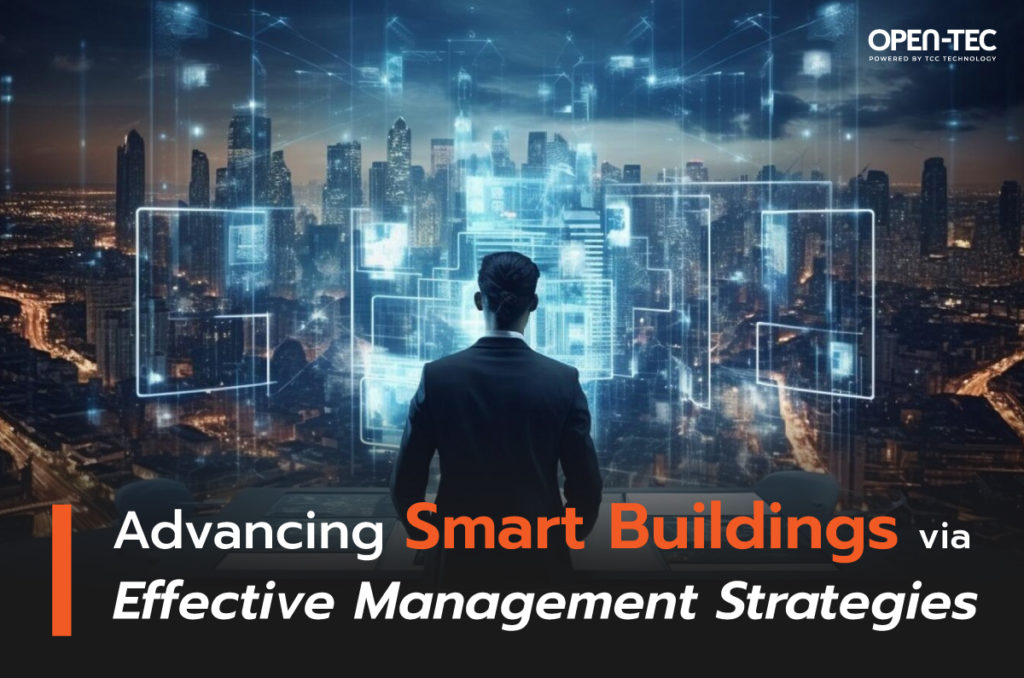Currently, “Smart Building” systems have become a new standard in building construction. Through studies it has been found that the number of buildings using smart building systems is expected to increase by more than 150% by the year 2026*. Implementing smart building systems in business sectors will not only enhance cost management efficiency but also reduce labor and repetitive work. Today, OPEN-TEC (Tech knowledge sharing platform), powered by TCC TECHNOLOGY GROUP, has gathered knowledge from experiences in managing and providing technology consultations, aiming to elevate organizations’ ability to efficiently manage smart buildings.
What is a smart building?
According to the definition provided by WiredScore**, “smart building” refers to a user-centric building that leverages technology to improve cost efficiency, convenience, environmental friendliness, and proactive design.
Factors Towards Smart Building
As previously mentioned, technology plays a crucial role in elevating smart buildings. The application of technology involves six main factors**, including Individual and collaborative productivity, User health and well-being, Community enhancement, Sustainability, Maintenance and optimization, and Security.
Designing or constructing smart buildings is essential, requiring long-term planning to cover every stage and selecting technology suitable for various real estate types. For example, Commercial real estate may need technology for managing temporary access, Residential real estate for regular access management, and Industrial real estate for controlling machinery operations, among others.
“People Process Technology” 3 Main challenges of Transformation
Beyond the aforementioned points, there are three main challenges that the real estate sectors must face during the transition to smart building systems. These challenges include people, process, and technology. People will need to possess knowledge of technology to reduce errors during operations. Furthermore, processes should be aligned with objectives. Lastly, selecting suitable technology for each type of real estate is crucial, such as applying the Building Information Modeling (BIM) and Computerized Maintenance Management System (CMMS). Overcoming these challenges in all three aspects help facilitate the transition of the real estate sector to become smarter.
Green World Vision – New Perspectives for Tenants, Buyers, and Investors
Apart from the challenges, the real estate industry and building users emphasize the importance of incorporating ESG principles (Environment, Social, Governance) as organizational standards. This emphasis has led to the push for constructing green buildings, incorporating technologies such as automatic lighting control to reduce energy waste and improve energy management efficiency. These initiatives contribute to sustainable and efficient smart building management, aligning with Thailand’s goals for carbon neutrality outlined in the Nationally Determined Contribution (NDC).
Lastly, the effectiveness of smart buildings relies on careful planning and management in terms of people, process, and technology. Smart building systems have the potential to propel the real estate sector towards sustainability. The content, mentioned above, has been gathered by OPEN-TEC, citing the sources from the “Building Tech Forum 2023,” organized by the Faculty of Engineering, Sripatum University, under the theme “Building System Technologies in the Digital Era.” Special thanks to Dr. Thiti Vacharasintopchai, Smart Property Project Director at T.C.C. Technology Co., Ltd. (TCCtech), for sharing knowledge specifically in the field of Smart Building.
Article by OPEN-TEC
Reference:
*1.Smart building deployments are headed through the roof
https://www.insiderintelligence.com/content/smart-building-deployments
**2.Smart buildings. Our future is smart. SmartScore white paper. April 2021.
